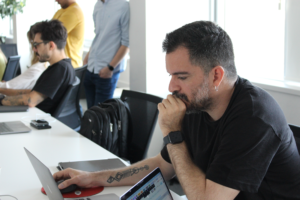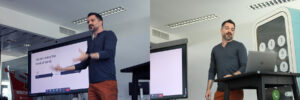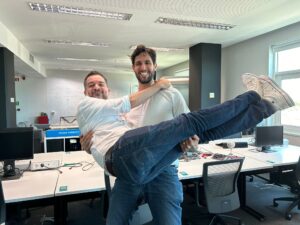Despite having worked in interface design for quite some time, the start of my professional journey took place in digital or advertising agency environments. In 2019, I fully shifted my focus to product design and decided to list the lessons learned frustrations, and insights gained along the way. If you are considering shifting your career to UX or PD, you probably will need a little more than post-its and auto-layout Figma tutorials.
You become an expert in learning

One day, you’re designing a self-service app for a car rental company, and the next, you’re tasked with creating an app for the government of Kuwait to improve healthcare services with a small requirement of reaching 100% of the population. A few hours later, you’re testing the limits of how many browser tabs you can open at once and diving into a vortex to learn about Muslim culture and how sexism can affect a woman’s experience when using an app to schedule a gynecological exam.
Fluency in the language isn’t just necessary; it’s your main work tool
Six years at a multinational company put my English skills to the test. While many believe that intermediate English is enough for day-to-day activities, remember that part of a Product Designer’s core responsibilities is extracting information from users and presenting your work to stakeholders. In this regard, the challenge often involves obtaining information without asking directly, which requires a certain command of the language—especially to understand responses without constantly asking the other person to repeat over and over.
Storytelling will make your life easier

Connecting with the previous point, storytelling will help you when working with interfaces and determining how the product “talks” to the user, but it will also help you when presenting results. Presenting the outcome of a Sprint to the technical team is not the same as presenting it to stakeholders. Being able to provide the context of the project in less than two minutes to that C level not listed in your calendar event but decided to attend your Sprint Review is a skill you’ll need to master.
Impostor syndrome will always be lurking
As I mentioned at the start, you’ll be an expert in learning. Sometimes, a colleague with fewer years of design experience will show a level of confidence that makes you question your own—possibly because he has more experience with projects for the Kuwaiti government, for example. Understand that this is part of the process, just as you’ll likely be a pro in aspects that your colleague might not have a clue about. Learn that lesson ASAP and keep it up.
Your ego will go hungry
This part is more directed to those coming from the advertising or similar markets. The visibility your work gets is quite different now. Sometimes a one-week project that doesn’t seem to have undergone any visual changes might be the project that, from a product perspective, had the greatest impact. It’s important to understand your role from the start and to learn that victories will come in different packaging.
A good leader/team is the best gift your career can have

I believe this applies to any career, but being in an environment where your well-being isn’t constantly under attack makes life easier. If you’re doing well internally, the first layer that will feel the impact is your team. Having a healthy environment where you can share and listen without it blowing up in your face helps you focus on what matters. Another important point is having a leader who gives you the chance to show what you’re capable of. Responsibilities will increase, but after all, you hold a Senior title for a reason, right?
Probably, there were more lessons through this journey, but let’s keep it for another moment in the future.
I dedicate this post to my colleagues at OutSystems, who have helped me learn these lessons over the last almost 60 months (or uncountable PIs).